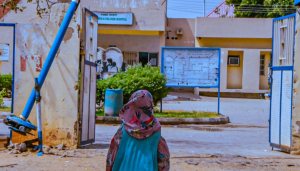Creating a safe space for victims of gender-based violence in Yobe state
Damaturu, 1 July, 2024 - The first time Amina Tijani (name changed) 17 years old, visited the Women and Children Health Facility in Damaturu, Yobe State, she looked around anxiously and was unsure whether she could share her experience or not. Reassured by the friendliness of the health worker who promised her complete privacy, Amina was able to share her story about her abuse.
“I was asleep when I felt the inappropriate touch. I began struggling and crying, begging him to stop. But he was much stronger and raped me, she says in a shaky voice.
The perpetrator whom she sees daily threatened to kill her and her family if they reported She lived in silence, fear, and trauma for over two months, until her guardian took her to the health centre to seek professional health.
After three weeks of professional care, Amina says “I am happy to seek help. I now know I did nothing wrong nor was it my fault. I am learning to look at life positively and will go back to school to complete my education.
The health workers provide professional and emotional support, including medical check-ups and alerting the authorities on gender-based violence reported in the facility.
Like Amina, many women and children in the locality have suffered sexual and gender-based violence, but only a few summoned the courage to seek help. Gender-based violence (GBV) remains a pervasive issue, affecting millions of people, especially people in humanitarian-affected regions like Borno, Yobe, and Adamawa states (BAY), northeast Nigeria.
Currently, about 2.1 million vulnerable persons in the BAY states require protection against gender-based violence in 2024, due to the prolonged humanitarian crisis. Of which, 1.3 million people are targeted, and about, 500,000 are women, 800,000 are children, and about 9% are people living with disabilities.
This year, Yobe state has reported over 490 GBV cases from January to April 2024. The World Health Organization (WHO), with funding from the United States Agency for International Development/Bureau for Humanitarian Aid (USAID/BHA) is strengthening the capacity of 130 primary healthcare workers in the state to respond to sexual and gender-based violence (GBV) and provide survivor-centred care.
In collaboration with over 10 civil society organizations (CSOs), WHO is supporting Yobe State government to facilitate access to quality health services for survivors of GBV with medical and psychological needs in the 17 Local Government Areas (LGAs) in the state.
A health worker at the facility Musa Adamu (name changed), says “Sometimes victims do not realize they are being abused or are scared to reach out for help, fearing it will aggravate the problems or that the services will not be confidential.
We offer a patient-centred approach, we not only provide medical and psychosocial help but also educate the community on sexual and gender-based violence and the need for timely medical help”.
The services provided in the safe centres include treatment of physical injuries, prevention of HIV/AIDS, unwanted pregnancies, sexually transmitted infections and counselling for severe psychological problems. The team also raise awareness within the communities on the importance of timely medical and psychological care through health education and outreach activities.
“WHO’s leadership in championing GBV response services is very commendable,” says Mr Abudllahi Danchuwa, the Chairman, of the Committee for the Sexual Assault Referral Centre (SARC). “WHO provides relentless support in ensuring underserved and exposed populations have access to GBV by impacting health providers with skills to identify signs of violence, deliver appropriate first-line support including psychosocial support, as well as provide appropriate referrals to higher health facilities and social support services if needs be.
“They also provided technical support, equipping SAR Centres, and on-the-job mentoring. I am optimistic that the collaboration will continue and that vulnerable people will continue to have access to GBV services, added My Danchuwa.
The support provided is in line with the fourth WHO Nigeria Country Corporation Strategy (CCSIV), and the Sector Wide Approach (SWAp), among other priorities championed by the Federal Government of Nigeria, to improve the quality of care and service delivery in PHCs, thereby ensuring access to health services.
“Sexual assault, domestic violence, women and child abuse are all emergencies, affecting thousands of people in Yobe state. WHO acknowledges a responsibility to support the government in responding to the needs of the most affected population. As such, WHO is ensuring that health providers at the Primary Health Centres (PHCs) and health champions acquire the relevant skills to enable them to identify women in danger before the violence escalates, provide appropriate clinical care, reduce negative health outcomes of violence, assist survivors in accessing help, says Ms Sylvia Opinia, WHO Coordinator for the Prevention and Response to Sexual Misconduct.
Besides the PHC approach, the state ensured that GBV services are provided to vulnerable populations in underserviced communities through the WHO-supported mobile hard-to-reach teams and Civil Society Organizations (CSOs).
“In the first quarter of 2024, at least 66,000 persons were reached with GBV messages through the WHO-supported mobile hard-to-reach teams. Of the number reached, about 40 persons were referred for further management, added Dr Kumshida Balami, WHO Interim Northeast Emergency Manager.
“This strategic approach is part of WHO’s commitment to strengthen the health system in Yobe state, adds Dr Balami.
